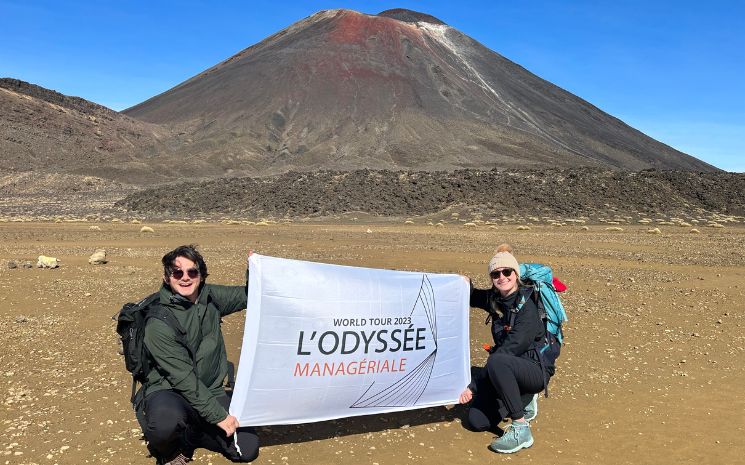
Society and Business in New Zealand: A Critical Sense of Belonging
Lepetitjournal.com spoke with Elodie and Dimitri, two students who set out to meet the world of New Zealand entrepreneurship through a managerial Odyssey. Mentalism, resistance to innovation, a sense of community, an inclusive paradigm… These are the themes that the two students visiting the Kiwi Islands hold particularly dear.
Elodie and Dimitri, two students searching for answers to their questions about entrepreneurial practices today and tomorrow, went for over 6 months in 8 different countries. In search of the crises that structures are going through today, they question and question the administrative practices of the future. decipher their residence in New Zealand.
What are the main characteristics you retain from the management practices of New Zealand companies?
What stood out to us was The importance of a sense of community in the Management.
New Zealand is a small country at the end of the world, with a population of 5 million, so the feeling of belonging to the same community is very present. This has many consequences in the world of work.
This often allows for strong empathy in management and we will consider the other’s limitations when we ask him or her to accomplish a task. And sometimes this goes to extremes: Alexandre Cagnoli, a Frenchman working for Véolia in New Zealand, explains to us that one day, when he was offering a contract with a performance guarantee, a client told him “But finally, Alex did not meet such deadlines and such quality , It will be very difficult to maintain and uncertain!”
Also, when there is a decision to be made, a lot of time is spent outlining the decision-making process The most comprehensive and fairinstead of thinking about the decision itself. For example, we caught up with Susan Pasterfield, an ambassador for the Enspiral Foundation who told us that the term “business family” Can be used to talk about Enspiral. We imagine with this name the importance that the community has in New Zealand.
Maintaining human connections is very important to New Zealanders, and this goes beyond considerations of productivity. For this same reason, New Zealanders often tend to shy away from conflict and speak less directly, we’re told.
What are the major administrative crises in New Zealand today?
One of the difficulties we’ve noticed in New Zealand is a certain resistance to change. To be more precise, there is a certain amount of mistrust of innovations from elsewhere, whether they relate to technical processes (such as waste management, which is far behind in New Zealand), or administrative methods. Telecommuting is somewhat shunned, and concepts like the 4-day week, hallucinations, and sociability don’t seem to interest the Kiwi. They prefer to take the time to find their own way, and if this has good aspects, it may also cause a certain delay in adapting to the changes in the mentality of the new generations at work.
How do administrative practices in New Zealand differ from those in France?
In France, we tend not to show our emotions too much at work, especially in a boss-managed relationship. We will endeavor to be ‘professional’ where New Zealanders are most realistic in the business.
Also, in France, we tend to point the finger first at areas of improvement, in other words, the negative before the positive. Conversely in New Zealand the influence of Anglo-Saxon culture as well as the necessity of maintaining group unity leads them to adopt a more encouraging and more accommodating administration.
Finally, there is more research to include diverse people in corporate decision-making. Where in France there is a tendency to appoint an expert or a particular group of decision-makers, in New Zealand the commission is adapted according to the decision.

“Organizer. Social media geek. General communicator. Bacon scholar. Proud pop culture trailblazer.”



